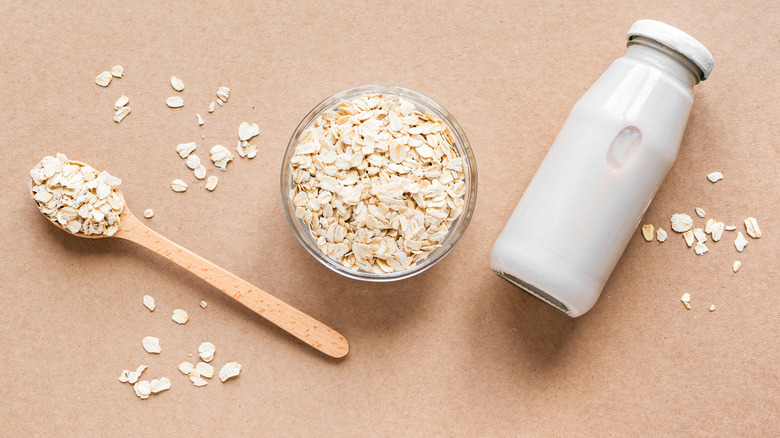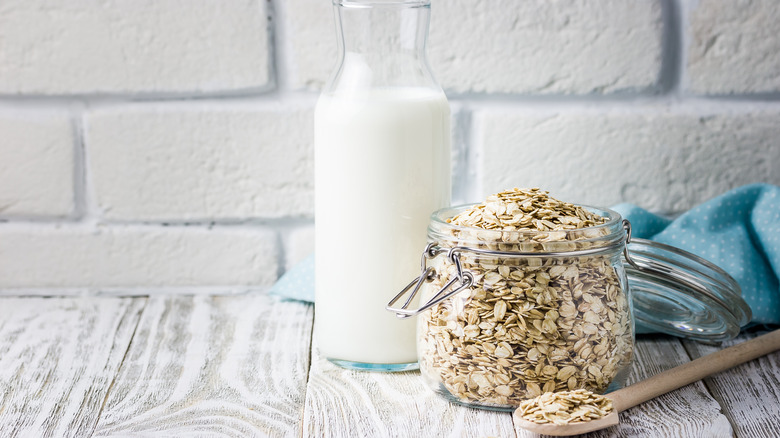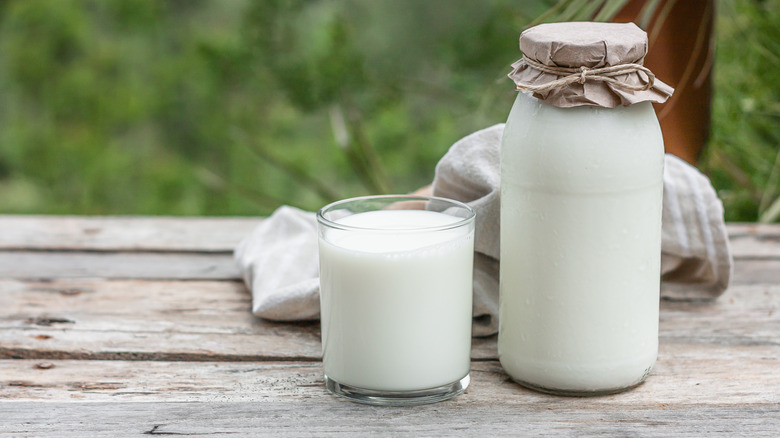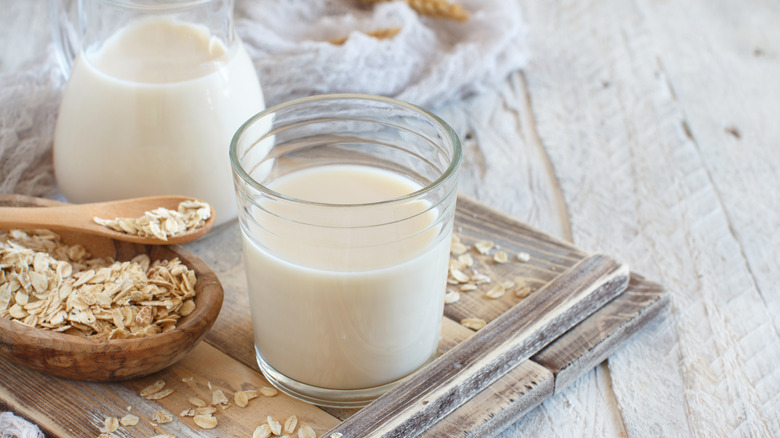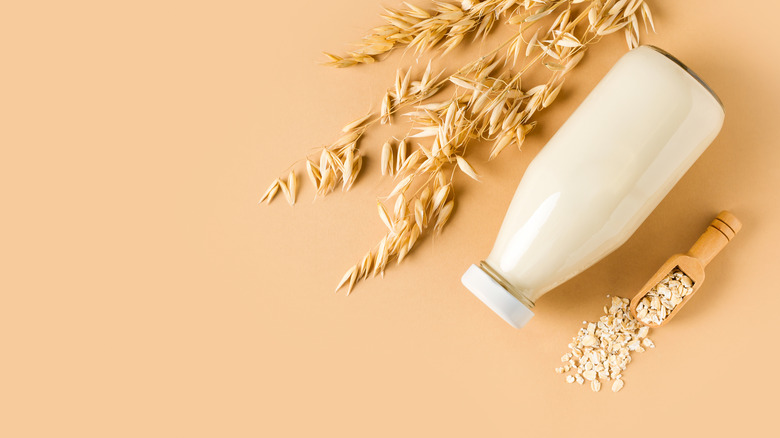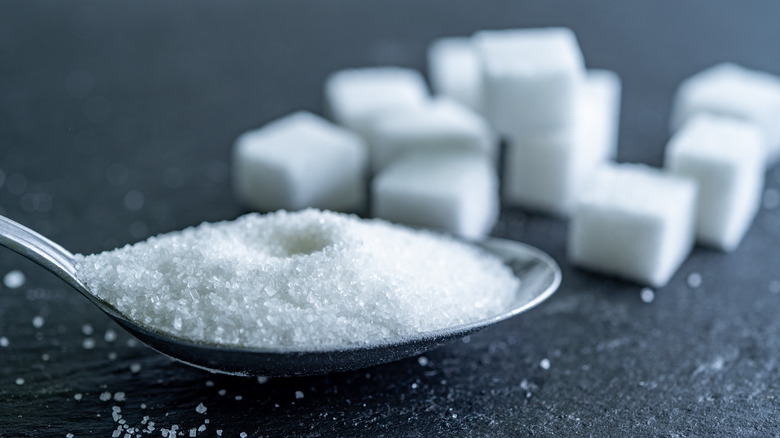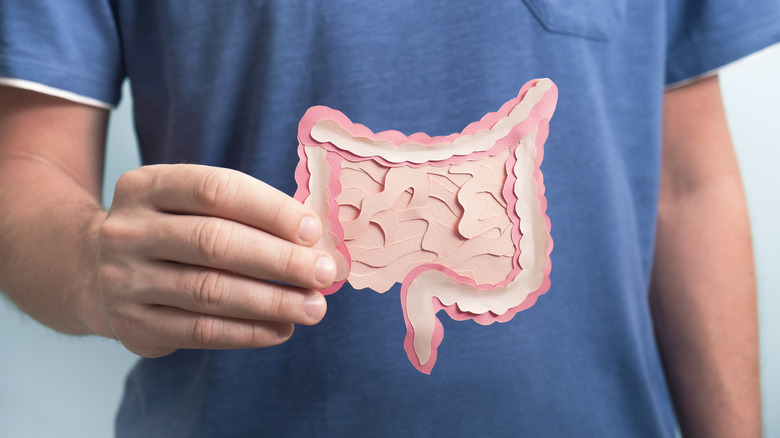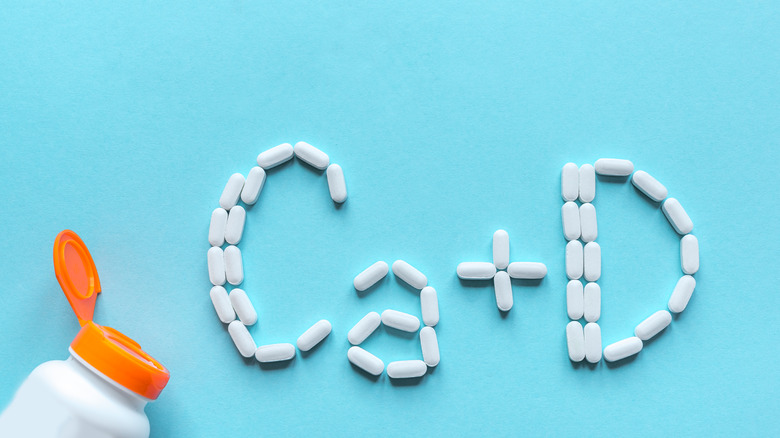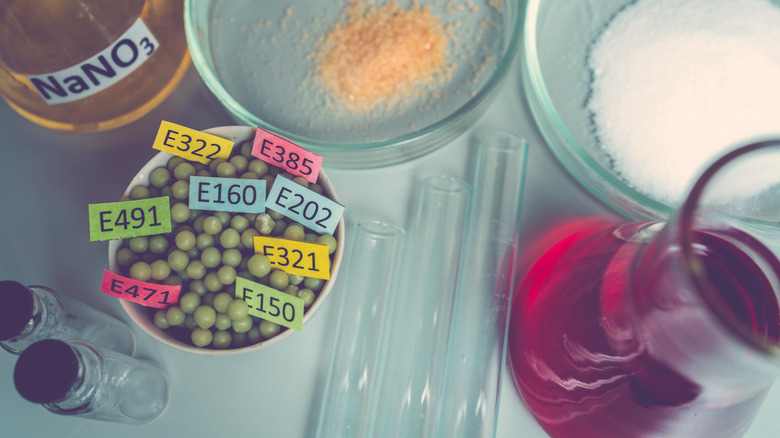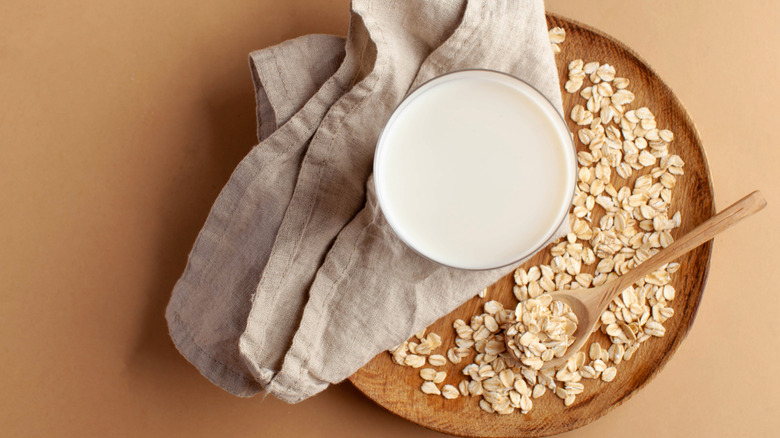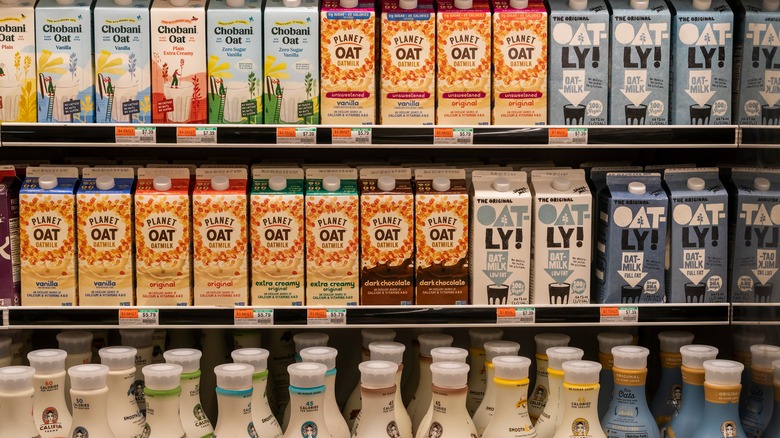When You Drink Oat Milk Every Day, This Is What Happens To You
Gone are the days of oat milk being a niche product. These days, oat milk, along with other plant-based milk alternatives, are everywhere, and sometimes seem to rival the popularity of classic cow's milk. This isn't just something which can be seen in the U.S. In the United Kingdom, for example, the amount that people spent on oat milk almost doubled in the space of a single year, according to Mintel, with the global oat milk market projected to reach a value of well over $2 billion by 2026 (per Global Newswire).
What's causing the explosion in popularity? A few reasons — an increasing shift to plant-based diets, the desire to buy more environmentally friendly food products, and the fact that it's just very tasty — all seem to be contributing to people reaching for cartons of oat milk with ever-increasing frequency. But there's also the fact that oat milk brings with it a range of health benefits, with the drink containing excellent amounts of vitamin B, fiber, and a good amount of protein, according to Well+Good.
However, as with most things in life, you can get too much of a good thing, which raises the question: If you're making the switch to a daily glass of oat milk, what will happen to your body?
Drinking oat milk every day could help your food move through a little easier
If you find that you're having a little trouble when you go to the bathroom, a daily glass of oat milk could be just the ticket. Oat milk is an excellent source of fiber, particularly for a drink. The Cleveland Clinic notes that you'll typically consume around 2 to 3 grams of fiber per serving. As functional medicine dietitian Jorden Edinger told the Clinic, this fiber content compares favorably to other milk alternatives — it's "a bit more than most almond milks but less than a bowl of oatmeal."
That fiber can do wonders for your digestive system. According to WebMD, the fiber in our diet interacts with our food and stool, helping our bodies slow digestion, absorb nutrients, and add bulk to the stool. This helps stool move through the digestive system faster and with more ease, reducing the likelihood of constipation. As UCSF Health explains, adults should be looking to get around 25 to 30 grams of fiber from their diets daily, but most Americans average out at about 15 grams a day. So, if you're looking to increase your fiber content and ease your life in the bathroom, oat milk could be a good way to go.
You'll get good protein from drinking oat milk every day
If you're a budding bodybuilder, you don't need to slam cow's milk all day anymore to get your protein -– enter oat milk. While not as high in protein as cow's milk, oat milk still contains — as registered dietitian Lauren Hoover states to Eat This, Not That! – "about 4 grams of protein per serving." We've gotta be honest, this isn't a bad amount for a drink –- and it gets even better when Hoover points out that this is "higher than some other popular milk alternatives, including almond milk, cashew milk, and coconut milk."
It's important to note that a boost of protein every day isn't going to necessarily get you ripped, but it will help your body go through a huge amount of necessary functions and keep it ticking along healthily. As MedlinePlus states, we are quite literally made of proteins –- they are the "building blocks" of our bodies. Without getting enough protein, the body isn't able to make new cells or repair damaged ones, and this is vital both while we're growing as children and teenagers, and in later life to help maintain good health.
Drinking oat milk may help you maintain a feeling of fullness
It's hard to think of a lot of drinks that'll leave you feeling satisfied afterward, but oat milk may just be the ticket if you're looking for one. Oat milk contains two key nutrients which can help people maintain a feeling of fullness: fiber and protein (via Cleveland Clinic). Food products that contain fiber tend to be more filling than lower-fiber foods, keep us satisfied and eating less, and can also help to reduce the absorption of sugar and the spiking of blood sugar levels that can leave us feeling hungry fast (per the Mayo Clinic). It should be pointed out, however, that eating too much fiber suddenly, or incorporating fiber into your diet too quickly, can cause cramping and bloating.
The protein in oat milk also helps to maintain fullness, as protein takes longer to digest than other food components (per the Cleveland Clinic). However, as Healthline states, oat milk may not be as filling as other types of milk, like cow's milk, as it contains a fair amount less protein, and also may contain less fat too.
Your teeth will thank you
When you were a kid, were you told that drinking milk would give you strong teeth? Well, if you were, rest assured that it wasn't one of the white lies parents tell their young ones. The calcium that cow's milk contains is hugely important for the maintenance of tooth health, according to research undertaken by the American Society for Bone and Mineral Research and discussed via WebMD. According to Elizabeth Krall, who was a researcher at Boston University Dental School and Tufts University Nutrition Research Center at the time of the research, calcium can help to "improve tooth retention, along with routine dental care and good oral hygiene."
But the good news is, you don't need to drink cow's milk to get that calcium –- oat milk's got you covered. As Colgate states, non-dairy milks like oat milk can provide great calcium content when fortified with the mineral. One cup of fortified oat milk can provide as much as a quarter of our calcium daily value, writes registered dietitian Jaclyn London for Good Housekeeping. So grab a glass of oat milk and keep those pearly whites glistening.
If you have type 2 diabetes, drinking oat milk may not be the best choice
While oat milk may be marketed as a healthful alternative to regular cow's milk a lot of the time, the truth is that it may not be the best choice for everyone. For people who have type 2 diabetes, drinking oat milk every day may have unintended consequences thanks to the sugar content of the drink.
As Eat This, Not That! discusses, oat milk comes with a good level of fiber, which according to Everyday Health can help to control blood sugar levels, and which can be beneficial for people with type 2 diabetes to have in higher levels in their diet. However, oat milk also has a higher level of sugar than a lot of beverages and can contain grams of added sugar per serving, which can lead to a spike in blood sugar. Additionally, as Manhattan Beach-based registered dietitian nutritionist and certified diabetes expert Lori Zanini states to Eat This, Not That!, "when it comes to blood sugar management, it's important to realize that liquids digest much faster than foods and impact our blood sugar in a different way, much more quickly." As such, for people with diabetes, it may be better to consume fiber without added sugar, which can be achieved by adding oats or other whole grains to the diet.
Drinking fortified oat milk could help you boost your vitamin levels
Any drink that comes with a solid vitamin content isn't to be sniffed at, and by drinking oat milk every day, you might find that you're boosting your vitamin levels without even trying. Oat milk is frequently fortified with added vitamins and minerals, and it can pay off to opt for one that has particular nutrients added. According to Margaret Rayman, a professor of nutritional medicine at the University of Surrey, who spoke to Good To Know, "if you want to drink oat milk, look for one that is fortified with iodine, calcium and preferably also vitamin B12 and vitamin D."
Enriched oat milk, according to Healthline, could contain half of your B12 daily value per serving, as well as a quarter of your recommended calcium intake and 20% of your vitamin D daily value –- not bad for a humble drink! And if you didn't think you needed the iodine that Rayman suggests you look for in oat milk, think again. As the National Institutes of Health states, iodine is an essential mineral needed for the production of thyroid hormones, helping to regulate your metabolism and multiple other bodily functions. We can get on board with that.
Drinking oat milk daily can help bolster your immune system
Doing what we can to maintain a healthy immune system is vital to keep our bodies protected from illness, and a daily glass of oat milk could help give your immunity the boost it needs. This is all down to the vitamin D that fortified oat milk frequently contains. As nutritionist Mina Khan states to Good To Know, "oat milk contains more vitamin D than cow's milk," and this vitamin provides a range of benefits, from "promoting good bone and dental health" to –- you guessed it! –- "strengthening the immune system."
The link between vitamin D and the immune system has been well-observed. As research published in the Journal of Investigative Medicine states, vitamin D can help to modulate immune responses, and lack of vitamin D can lead to increased susceptibility to infection and illness. While the most tried-and-tested source of vitamin D is sunlight (per Healthline), getting a little extra in your diet isn't a bad thing.
Oat milk can help to lower or maintain cholesterol
Oats are a marvelous thing –- and being able to drink them? Some people might say we've peaked as a society on that front. One of the reasons oats, and the milk that's made from them, are so wonderful are thanks to their content of beta-glucans, specific types of soluble fiber that have powerful effects on maintaining cholesterol (per the British Heart Foundation). One glass of oat milk (around 250ml) contains around a gram of beta-glucans, a third of the recommended three grams per day to help maintain cholesterol health.
And drinking oat milk may not just help you maintain cholesterol levels, but lower them too. This is according to a study published in the Annals of Nutrition and Metabolism, which looked at the effects on cholesterol levels following participants drinking oat milk over five weeks. At the end of the study, it was found that the participants not only had lower levels of serum cholesterol, but also lower levels of LDL cholesterol (the "bad" kind) as well. Now, excuse us while we head to the fridge and pour ourselves a glass....
Drinking oat milk daily may boost your sugar intake
Oat milk may often be branded as a healthier alternative to regular milk, but there are aspects to it that can reduce this quality somewhat. In particular, oat milk's sugar content might be something to keep an eye on if you're drinking it every day. As the USDA states, one cup of certain brands of oat milk can contain around seven grams of sugar, which, while not a huge amount, is worth considering if you're introducing it and adding it to your regular diet.
It's also useful to discuss the type of naturally occurring sugar that's in oat milk: maltose. As Amy Shapiro, registered dietitian and founder of Real Nutrition, states to Brightly, maltose's composition of two glucose molecules means that it "affects your blood sugar more quickly and dramatically," which is an important factor to consider if you're diabetic or have other metabolic factors in your lifestyle. Having said that, Shapiro adds that "just like anything else, consuming oat milk in moderation isn't terrible," and states that the important thing to do when you're choosing a brand is to look for a product that has a minimal ingredient list, "free from gums, thickeners, and oils."
Oat milk could improve your gut health
Praise be to the gut. Our gut health, and the health of the microbiome that exists within it, are vital to maintaining multiple aspects of our body's regular function (via UC Davis Health). And by drinking oat milk every day, you could be doing your gut a world of favors. The beta-glucan fibers that are found in oat milk have been found to help bolster our gut health and microbiome, as shown in a study discussed via Science Daily, which found that participants who ate beta-glucan-enriched pasta not only saw a reduction in their cholesterol levels but a marked increase in gut health too.
According to Healthline, fibers like beta-glucans work to help healthy bacteria thrive in the gut. Fiber acts as a food for our microbiota, meaning they're able to multiply faster and populate our gut in higher quantities. As the bacteria we have in our gut and intestines grow in number, the mucus wall in our intestines — which acts to help keep inflammation down in the body — gets thicker and stronger, and the bacteria can help keep our digestion healthy more efficiently. Win, win.
If you're trying to keep it gluten-free, watch your oat milk intake
So we realize that this one might cause a bit of head-scratching. Oats aren't wheat, right? Well as it turns out, oat milk may not exactly be the best choice for those who are trying to avoid gluten, and it pays to check the label thoroughly before you buy.
As Alicia Galvin, a registered dietitian working in Dallas with Sovereign Laboratories, says to Eat This, Not That!, oat milk may be problematic for those avoiding gluten as "oat is very similar in molecular structure to gluten, so the body can get confused and react to the oats as it would to gluten." Unfortunately, as Galvin says, oats have a "high cross-reactivity rate" for those with gluten sensitivities, and it means that picking up any old brand may not cut it. As a result, it's recommended that you make sure that your oat milk is certified gluten-free, or that it uses "purity protocol oats," according to registered dietitian and celiac disease treatment specialist Tayler Silfverduk (via Eat This, Not That!). If you have a gluten sensitivity and notice any gas, abdominal cramps, bloating, or nausea (among other symptoms, according to Beyond Celiac) after ingesting oat milk, you might want to double-check whether the brand is safe to drink, and/or reduce your intake.
Drinking oat milk every day could support your heart health
Making dietary choices that help to maintain our health is a wise move, and none more so than choosing foods that help to protect our hearts. And if you're drinking oat milk every day, you're in luck, thanks to what some people might deem a miracle ingredient: beta-glucan fibers. As shown in a research review published in the International Journal of Biological Macromolecules, consuming beta-glucans regularly has a huge bearing on heart health, thanks to the fiber's interactions with several health factors that affect the risk of cardiovascular disease. In addition to helping to regulate blood sugar, beta-glucans could also help in maintaining or reducing your levels of cholesterol, and can help to keep your blood pressure healthy, all factors in the development of cardiovascular issues.
And, beta-glucans, though their interaction with the gut microbiome, also help to keep our gut healthy -– and a healthy gut has a huge bearing on a range of health functions, relating particularly to the heart. Don't just take our word for it –- beta-glucans are so good for you that, as registered dietitian Kristin Gillespie says to Mind Body Green, "the FDA has actually designated a heart-health claim for foods that are rich in beta-glucan."
The B vitamins in oat milk could support your eye health
It's somehow easy to forget that our diet directly affects our vision, but it's useful now and again to remind ourselves that that's the case. And if you're in the market for a drink that helps support eye health, you're in luck with a daily glass of fortified oat milk.
Enriched oat milk varieties frequently come with good levels of riboflavin and B12, according to Medical News Today — and it's these vitamins that can help support proper eye function. In the case of B12, the vitamin (along with folic acid and vitamin B6) could help to reduce the risk of age-related macular degeneration, particularly amongst adults over the age of 40, as shown in a study published in the Archives of Internal Medicine (now JAMA Internal Medicine). Riboflavin could also be instrumental in the reduction of the risk of developing cataracts, according to a study published in the Ophthalmology journal, which also noted the intake of vitamin A, thiamin, niacin, and protein as being potentially helpful for eye health.
Oat milk could help you build healthy bones
So when people say that milk will make you big and strong, surely they just mean cow's milk, right? Well, don't write off oat milk's ability to do so too just yet! Oat milk is frequently fortified with two bone-boosting nutrients, calcium and vitamin D, according to WebMD, giving it healthful qualities for your skeleton similar to regular milk.
We all know how important calcium is for our bones, but it's sometimes not immediately clear why. The reason is that our bones — which are constantly being reformed as we age (per the National Institutes of Health) — are super-high in calcium. This calcium helps to reinforce the collagen framework that's made when our bodies create bone tissue, strengthening our skeletons, according to American Bone Health. Calcium can't work alone, though, and that's where vitamin D comes in to help our bodies absorb the calcium needed for bone health in the first place (per WebMD). Together, these two nutrients help to maintain bone health and reduce the risk and prevalence of osteoporosis and other bone-related conditions. So, grab yourself a carton of oat milk -– why should cow's milk get all the glory, after all?
Drinking oat milk everyday may boost your preservative intake
Although oat milk may seem like the epitome of healthy, if you're buying it from the store, you might want to check the label. Commercially made oat milk may contain ingredients that do not fill you — or your body — with joy. "Some brands add many preservatives to help the oat milk be more shelf-stable," says registered dietitian and The Wellness Whisk founder Maxine Yeung to Livestrong. Yeung explains that although the majority of additives are classified as safe for ingestion by the FDA, "you may want to avoid some if you notice any side effects."
One such additive, carrageenan, is commonly used in oat milk and other foods as a thickening agent. While carrageenan is approved for use by the FDA, question marks remain about its overall safety, as the additive may potentially cause inflammation, digestive issues, and even increase the risk of certain types of cancer says Medical News Today. If you notice any unusual side effects following drinking oat milk with additives, contact a doctor immediately.
Drinking oat milk every day may promote weight loss
For folks who can't consume dairy, oat milk is a far kinder alternative. But its benefits extend far beyond its gentleness on the gut. Drinking oat milk regularly may aid in weight loss, thanks to its nutritional profile when compared to cow's milk. "Unsweetened oat milk contains around half the calories of whole cow's milk, less than a quarter of the fat content, and less sugars," states Formulate Health founder and nutritionist Mina Khan to Good To. She adds, "In comparison, skimmed milk contains around 90 calories per cup, whereas unsweetened oat milk contains just 60." For those seeking to reduce their calorie intake, Khan recommends switching to oat milk.
But oat milk's potential to aid in weight loss doesn't stop at the calorie count. Oat milk also has, for a drink, a substantial amount of fiber and protein. Both the fiber and protein help to promote a feeling of fullness (although Khan does point out that the protein levels in cow's milk are more than double per cup serving). It's also worth nothing that among plant-based milks, oat milk has the highest number of calories — so if you're switching to a plant-based milk to reduce calorie intake, you may want to consider another variety that has fewer calories and carbs.
Oat milk may boost skin health
Oat milk doesn't just benefit your insides — it might benefit your outsides too. One area where you might notice a more immediate effect is on your skin, thanks to oat milk's potential cosmetic benefits. "Oat milk is a great antioxidant, repairing the skin from daily wear and tear, UV radiation, pollution, and more," states board-certified dermatologist Margarita Lolis to InStyle. As a research review published in the Journal of Drugs in Dermatology shows, antioxidants have been observed to help reduce inflammation, fight wrinkles, limit damage created by free radicals, and support healthy skin (although the research does indicate that most benefits have been found when examining antioxidants in isolation, and not when ingested as part of food).
The humectant properties of oat milk may also help to support skin health, Lolis states (via InStyle). Humectants help to bring water to the upper layer of your skin, giving it a healthier glow (per Healthline). It's useful to stress, however, that humectants are typically part of topical applications to the skin, and so the effects gained from drinking oat milk are less clear.
Drinking oat milk regularly could help prevent anemia
Some people may worry that by switching to oat milk, they might be missing out on key nutrients. But in fact, drinking oat milk regularly may help you get the nutrients you require and help prevent certain health conditions like anemia.
Store-bought oat milk can often be enriched with iron as well as other minerals like potassium and calcium, vitamins A and D, and B vitamins, says Healthline. While this is all good, it's the iron content we're particularly interested in. One cup of oat milk will deliver roughly 10% of your recommended daily intake for iron, according to registered dietitian nutritionist Kailey Proctor (via Pop Sugar). This iron supports production of hemoglobin, the presence of which allows oxygen to move properly around your body (via Cleveland Clinic). If you are deficient in iron, you can develop a condition known as anemia — this happens when the amount of oxygen traveling through the body is insufficient to support regular bodily functions, leaving you feeling fatigued and generally unwell (via Mayo Clinic). It's recommended that you consume a varied diet with multiple iron-rich foods to help prevent the risk of anemia, with beef, eggs, tofu, peanut butter, brown rice, lentils, beans, and spinach all being good sources. Your doctor may also prescribe iron supplements if you're particularly susceptible to anemia.
Oat milk may boost the health of your nails and hair
Let's face it: we all want strong, healthy nails and hair. And even if they're not at the top of your priority list, you probably wouldn't mind having them. So to give your nail and hair health a boost, try drinking a cup of oat milk daily. Oat milk is rich in vitamins and minerals, thanks to brands fortifying their products with added nutrients, explains nutritionist Mina Khan to Good To.
One such vitamin that's frequently added is vitamin B12, which is particularly beneficial to the production of healthy nails. B12 helps your body absorb iron and form red blood cells more readily, which then allows it to build stronger, less brittle nails, says Healthline. Other B vitamins, like folate, also help your red blood cells form and your nails stay healthy. This nail growth is naturally helped by the presence of iron, which is also commonly added to oat milk during the production process. This iron, as well as the vitamin A and B vitamins frequently added to oat milk, may also help your hair's health, strength, and growth, and help prevent hair loss (per Healthline).
Which oat milk brands are the best?
With seemingly countless oat milk brands lining the shelves, and more appearing each day, knowing the healthiest one to pick can be tough. Not all plant milk is made equal, after all! But there are a few things to look out for in your choice. Opt for a brand that's high in fortified vitamins, low in added sugar, and that isn't marketed as "barista" style, as these can often contain added fats, according to Eat This, Not That!. Oatly! Original Low Fat, Elmhurst Unsweetened Milked Oats, Moola's Organic Unsweetened Coconut Oatmilk, and Thrive Market Organic Original Unsweetened Oat Beverage are all great choices for their nutritional profiles, comparatively low ingredient lists, and low added sugar levels.
Choosing a brand that uses organic oats is equally as important as picking one that's nutritionally robust. "Conventional oats are commonly sprayed with glyphosate as a drying agent before harvest, which is a heavily used chemical weed killer now labeled by the World Health Organization as a probable carcinogen," explains "Nourish Your Tribe" author and registered dietitian nutritionist Nicole Magryta to Eat This, Not That!. Consuming glyphosates long-term may also lead to organ damage and reproduction issues, according to WebMD. Although some organic oats contain traces of glyphosate, it's not at significant levels, so organic oat milk is your safest bet.

